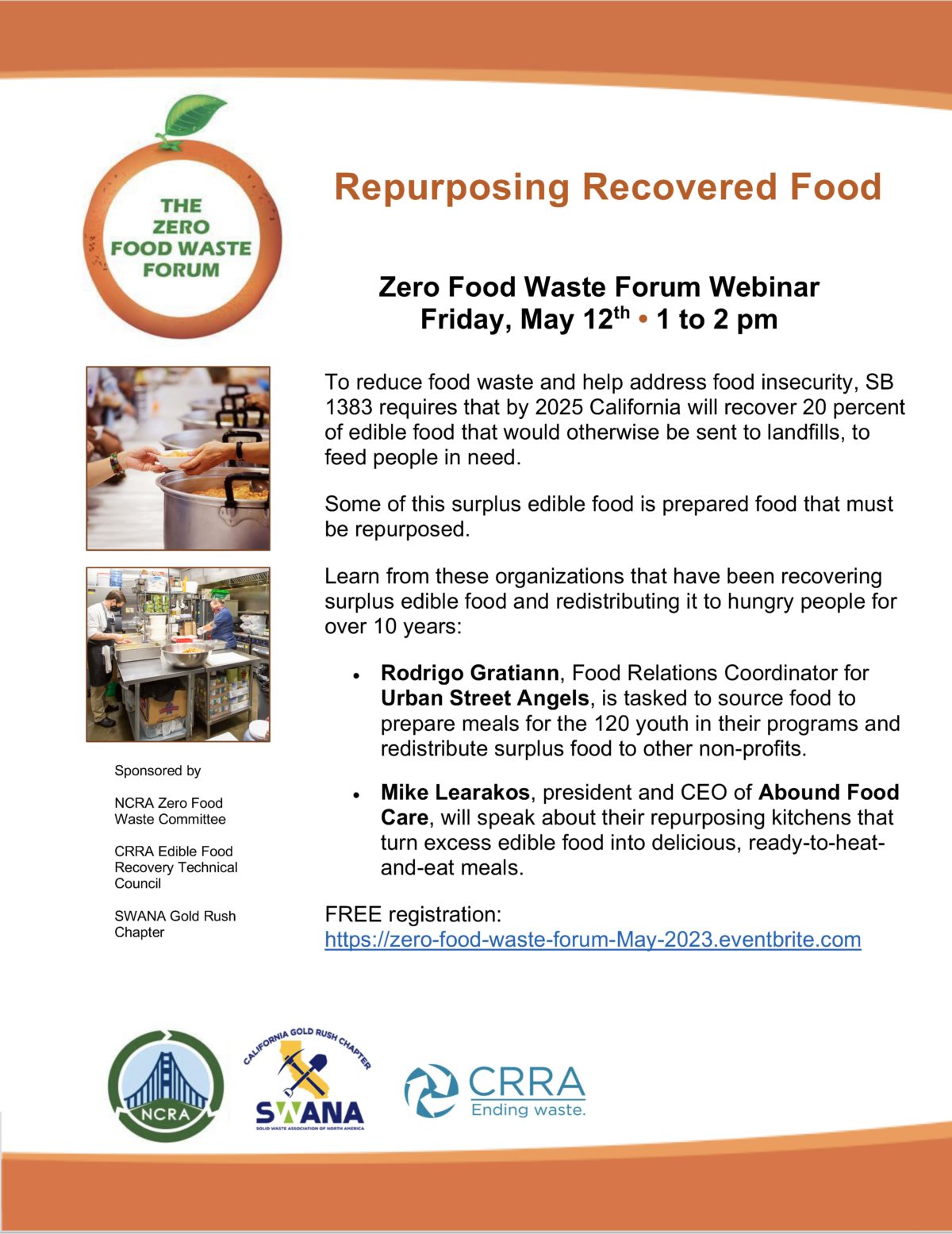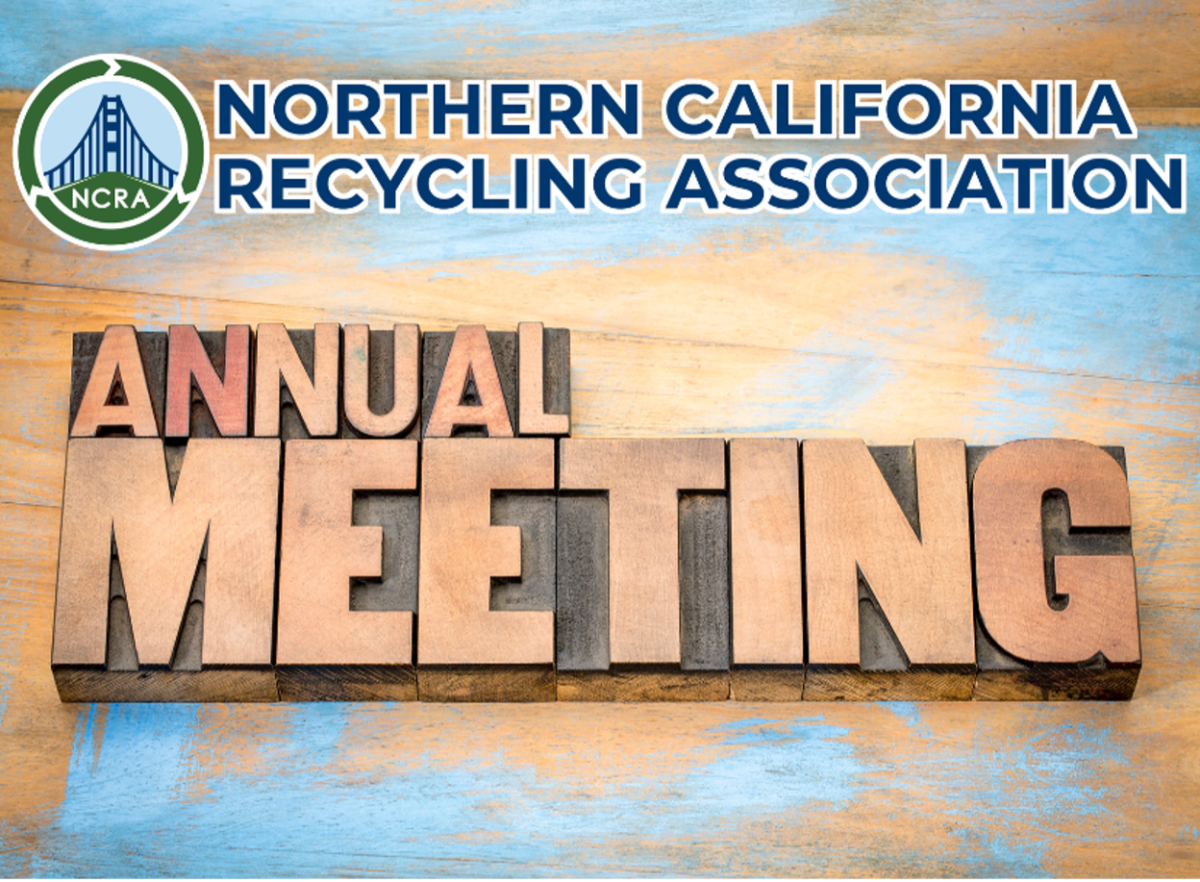Author: Editor
Repurposing Recovered Food, 5/23
Annual Meeting, May 18, 2023
Request To Support the Boone/Stein O-MRF/MxWP Lawsuit
 REQUEST TO THE NCRA BOARD AND MEMBERSHIP TO SUPPORT THE BOONE/STEIN O-MRF/MxWP LAWSUIT AND PROVIDE AN AMICUS BRIEF
REQUEST TO THE NCRA BOARD AND MEMBERSHIP TO SUPPORT THE BOONE/STEIN O-MRF/MxWP LAWSUIT AND PROVIDE AN AMICUS BRIEF
By Arthur R. Boone, Center for Recycling Research (CRR) and former NCRA President and long-term Board Member, 6/13/19, arboone3@gmail.com. Antoinette Stein, Ph.D. also contributed to this article.
INTRODUCTION AND BACKGROUND: For over 20 years, Waste Management of Alameda County has been planning to begin composting at their Davis Street Transfer Station (DSTS) near the bay in San Leandro. In the late 1990s an outdoor project was planned but due to worries about odors and equipment noise it was scrapped. In 2010 a second plan surfaced with indoor materials reception, prep and anaerobic composting envisioned. The City of San Leandro (CSL) approved that plan in 2011 and construction was completed on the building but not the inner workings. For some time, starting in late 2011, WMAC staff explored the idea of a mixed waste processing (MxWP) facility replacing the organics material prep space in the northeast building, which firmed up into a plan submitted in December 2016 to the Alameda County Waste Management Authority (ACWMA) with project review hearings in February and March, 2017.
Antoinette Stein, Ph.D., then a member of the Alameda County Recycling Board – a sibling agency to the ACWMA, and Arthur , former NCRA president, spoke at all three hearings of the project’s deficiencies as they saw them. In late March the ACWMA approved the project and Stein/Boone sought court review. At the Superior Court hearings, the judge agreed that substantial change was made to the project namely that it had tripled in amount of material being processed. She gave two tentative rulings in their favor only to reverse herself after hearing from attorneys on both sides of the issue. Since the middle of 2018, the matter has been before the court of appeals for this area and each of the parties have filed opening briefs and are in their final days of telling the court why they are right.
Stein/Boone are currently seeking persons and organizations (including NCRA) to endorse their side of the conflict and to file a document with the court known as an amicus brief which would state why NCRA supports the Stein/Boone position. NCRA president David Krueger has agendized the matter for the June 20, 2019 board meeting and all NCRA members are being given this briefing via the NCRA News for full enlightenment. Both the City of Oakland and the ACWMA are aware of this document and Stein/Boone think it only fair for NCRA members and boardmembers to hear and understand both sides of the issues being contended.
At the NCRA board meeting next Thursday, the board will be asked to approve of our lawsuit and to file an amicus brief with the Court of Appeals to explain how the WMAC/City of Oakland proposal to build a mixed waste processing plant (MxWP) in San Leandro, now known as an O-MRF, with an indoor composting facility and a separate anaerobic digestion (AD) facility and the ACWMA’s decision to approve the project were in error. Because of the way the matter is framed, the ACWMA is known as the respondent and the garbage company is spoken of as “a real party in interest.”
Ten Issues
- Measure D Issue: In its “Findings” section, Measure D 1990, now known as the Alameda County Waste Reduction and Recycling Ordinance, calls for serious attention to source separation. Section E reads in part: “Each person discards materials and should therefore be involved in solving the problems caused by the disposal of such materials; this involvement must include changes in individual behavior resulting from each person’s awareness of her or his role in creating or finding solutions to environmental problems.” There was no consideration of these strictures by the ACWMA, the City of Oakland, or any other person involved in the matter in the record in regards to this project.
- Participation Impacts Issue: Mr. Peter Maass, a councilmember from Albany on the ACWMA, asked at the hearings what would be the effect be of starting a garbage sorting factory to separate organics and recyclables from regular garbage to the current collection of green and blue cart materials. We know that local governments in Alameda County spend up to $50 million a year on their green cart collections programs; how many persons will stop sorting their discards? The proposer had no answer but the agency pushed on.
- Compost Quality Issue: Teresa Eade has been the organics lead at the ACWMA for several years with over 20-years’ experience in promoting composting programs. She heard the WMAC representative talk about composting with organics sorted-out from mixed waste and asked him via e-mail to answer her questions about the quality of compost made from mixed waste materials. He replied in general terms but also sent along technical articles, especially one from the UK Environmental Agency, that explained in detail the difficulty and toxic contamination impacts of mixing metals and plastics with organics in anaerobic digestion that then resulted in certain heavy metals migrating into the compost and making it unsuitable for agricultural application. (A phenomenon well documented in Europe). In 2018, the European Union ruled that by 2020 all organics throughout the 26 countries should be collected using source-separated methods. The reports he sent to Ms. Eade are in the administrative record but the ACWMA appears never to have considered them.
- MxWP Failures Issue: Arthur Boone is a 35 year veteran of the recycling industry but with limited knowledge of mixed waste processing and anaerobic digestion, but was useful because of his extensive history in garbage/recycling interface. His first comment at the hearings asked for some third party statements about MxWP. What he learned later was that both the Recycling Industries Coalition and the National Recycling Coalition had both opposed mixed waste processing with policy statements issued six months before the hearings. There are numerous failed mixed waste projects around the US and the mistreatment of discarded papers in mixed waste which end up in the compost feedstock also creates compost quality problems; Boone’s concerns were ignored. The agency relied throughout the proceedings exclusively on what the proposers said about the project and got no third-party input.
- Emissions Issue: Ms. Antoinette Stein was a member of the Recycling Board when the proceedings began. An Air Pollution Research Scientist, she has an extensive background in toxics and dealing with gaseous emissions from industrial processes. Her major concern was that they substantially changed the project after the 2011 CEQA approval, and that the new impacts needed to be addressed and mitigated especially in regards to the nearby disadvantaged community. She opposed the tripling the amount of organic material processed in the same size building, and the added step of removing odorous and toxic AD digestate when such activities were not permitted in the 2011 CEQA approval.
WMAC’s lead staffer said that the large biofilter installed outside the processing buildings would capture all gasses created in the buildings and would solve any and all of these problems. What he did not suggest was careful monitoring of the perimeter of the facility before and after operations began to check for methane levels in the ambient air. Methane is an odorless gas and whether it escaped into the atmosphere or was broken down in the biofilter would only be known by careful perimeter monitoring, odors were a big concern to WMAC but not all gasses have odors.
- Prior Support Issue: In September, 2016, four months before the hearings began, Ms. Sommer as agency director had written a letter to CalRecycle commending the project. This letter was never discussed at the hearings but turned up in the administrative record. The WMAC’s lead staffer said at a hearing that he had spent 18 months before the hearings telling people about the project and presumably had asked Ms, Sommer for this letter. Although there was no knowledge of this letter at the hearings, as it was disclosed after the hearing, it called into question any objectivity that staff might have had and, in general, the fairness of the proceedings.
- Environmental Impact Review Issue: CEQA says that when a project is modified with significant environmental effects, a re-doing of the EIR is required. In the first plan for this project, approved by the CSL in early 2011, the northeast building was fitted with simple screen and grinders as are found in many commonly-constructed compost prep facilities around California that receive source-separated materials. In the 2017 plan the northeast building was now fitted with 220 moving parts that would separate recyclables and compostables from garbage “up to 61%”. This is a very different function with very different outcomes and requires a full Environmental Impact Review (EIR). See Stein above on AD with mixed waste feedstocks.
- European MxWP Experience Issue: Europe’s has extensive experience with MxWP and AD; WMAC’s lead staffer bragged of the many facilities in Europe whose features were copied in this plan. He either didn’t know or failed to disclose that the EU was at the point of banning all composting from mixed waste materials in agricultural applications, a matter finalized in the summer of 2017, six months after the hearings were closed but discussed for years before enactment. It would appear that composting a “dirty” (i.e. contaminated) feedstock creates a less valued compost that would have questionable (and never considered) markets.
- SB 1383 Compliance Issue: State law enacted in 2016 has drastic requirements for 2020 and 2025 in getting organics out of landfill-bound materials. This issue was not raised by any of the parties at the 2017 hearings but is very important in assessing the project’s long-term viability. By allowing and encouraging buyers of disposal services in Oakland to bypass green cart collection services by relying on the OMRF facility, the City of Oakland loses its control over the ability of some accounts to contribute to the city’s overall organics diversion goal. Is this good?
- Traffic Issue: In his statements at the hearings, WMAC’s lead staffer was proud that composting on site would reduce outbound truck trips. Since composting reduces the volume of compostable materials by (usually) about 50%, if it takes 12 truck trips each day to haul away all of DSTS’s compostable materials, it will take only 6 truckloads to haul away the finished compost; that would clearly be a local gain. Later on, however, this same spokesperson told his audience that he expected to line up other trucks from other communities to drive in that would use the facility as a “state of the art/first of its kind” project but he never mentioned the untabulated and not discussed increase in truck traffic by these new customers. (FYI, DSTS operates at about 60% of its daily rated capacity; all recyclables now collected in Oakland and Hayward never enter DSTS.)
In conclusion, as moving parties in this process, we are not asking the appeals court to end the project, we are simply asking the court to find defects in the procedures that can be addressed by a more careful examination of the facts as they exist. We hope that NCRA will join us in asking this review and reconsideration and include such items as it chooses in its brief.
PS. I was given a copy of NCRA President David Krueger’s response to our Support Request. In the same way that he disagrees with my statements and conclusions, I disagree with his. Over the weekend I will respond with clarity and brevity, and as planned add footnotes and references to this Request. NCRA members interested in reading my reply and the longer version are welcome to request it at arboone3@gmail.com. All boardmembers will get a copy long before the Thursday meeting. I appreciate the tone of this discussion and I hope we can all keep to the matters at hand and reach good decisions; so far so good. ARB
Grant Report: Expanding Capacity for Waste Food Reduction in Alameda County
Summary of Altamont Wasted Food Grant 2017-18 – Expanding Capacity for Waste Food Reduction in Alameda County (pdf)




